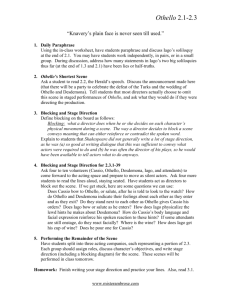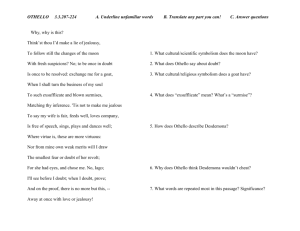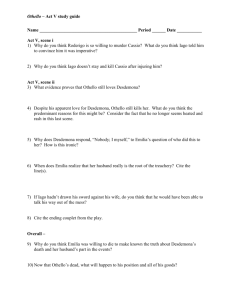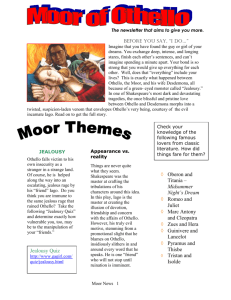Act three, scene three of Shakespeare`s Othello is an important
advertisement
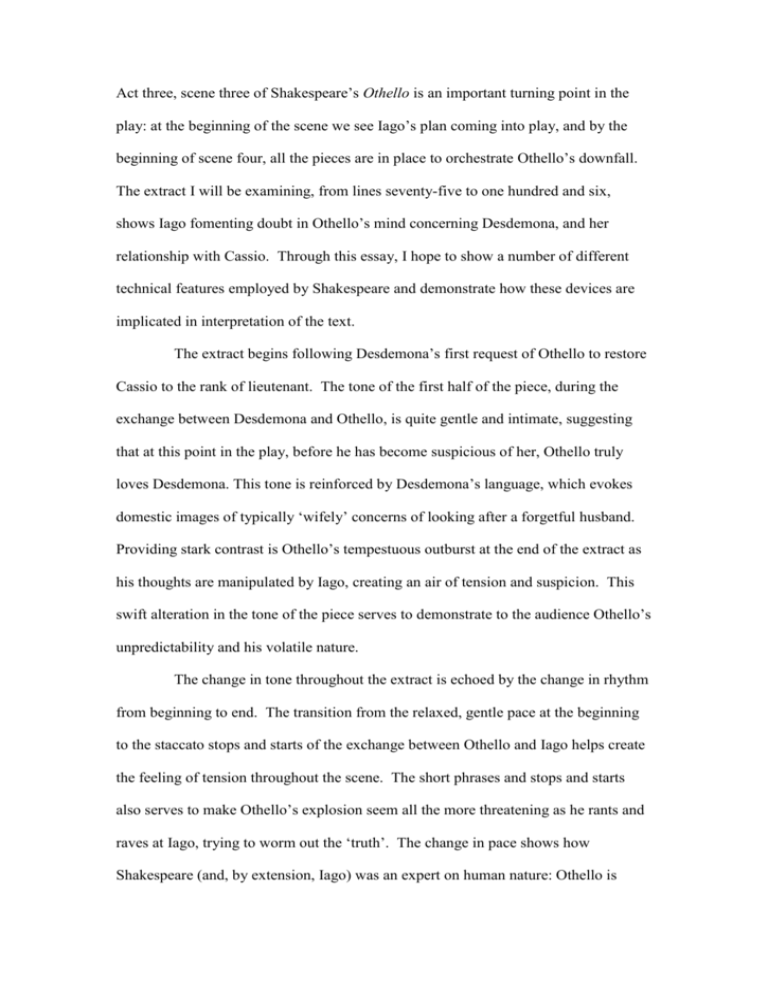
Act three, scene three of Shakespeare’s Othello is an important turning point in the play: at the beginning of the scene we see Iago’s plan coming into play, and by the beginning of scene four, all the pieces are in place to orchestrate Othello’s downfall. The extract I will be examining, from lines seventy-five to one hundred and six, shows Iago fomenting doubt in Othello’s mind concerning Desdemona, and her relationship with Cassio. Through this essay, I hope to show a number of different technical features employed by Shakespeare and demonstrate how these devices are implicated in interpretation of the text. The extract begins following Desdemona’s first request of Othello to restore Cassio to the rank of lieutenant. The tone of the first half of the piece, during the exchange between Desdemona and Othello, is quite gentle and intimate, suggesting that at this point in the play, before he has become suspicious of her, Othello truly loves Desdemona. This tone is reinforced by Desdemona’s language, which evokes domestic images of typically ‘wifely’ concerns of looking after a forgetful husband. Providing stark contrast is Othello’s tempestuous outburst at the end of the extract as his thoughts are manipulated by Iago, creating an air of tension and suspicion. This swift alteration in the tone of the piece serves to demonstrate to the audience Othello’s unpredictability and his volatile nature. The change in tone throughout the extract is echoed by the change in rhythm from beginning to end. The transition from the relaxed, gentle pace at the beginning to the staccato stops and starts of the exchange between Othello and Iago helps create the feeling of tension throughout the scene. The short phrases and stops and starts also serves to make Othello’s explosion seem all the more threatening as he rants and raves at Iago, trying to worm out the ‘truth’. The change in pace shows how Shakespeare (and, by extension, Iago) was an expert on human nature: Othello is baited through tidbits of information which never fully answer his questions, and which often pose questions themselves. Each character is characterised not only by their actions, but by their diction. Shakespeare’s careful choice of words for each character helps us gain insight into their thoughts and personality. The language of Desdemona, (supposedly) pure and innocent, is pragmatic and affectionate, even subservient, demonstrated by the lines ‘Emilia, come. – Be as your fancies teach you: / Whate’er you be, I am obedient.’ Othello, on the other hand, displays colourful language befitting an experienced soldier, cursing and (as a convert to Christianity) appealing to both heaven and perdition. Finally, Iago, master equivocator, employs loaded statements and echoed questions to entwine Othello in his trap. His obsequious methods of addressing his master, ‘my lord,’ ‘my noble lord,’ and finally: ‘My lord, you know I love you,’ the audience that Iago is adept in manipulating others to hear and to think what he wants them to. Another of the dramatic techniques prevalent throughout this extract, and the entirety of Othello, is tragic irony. In the extract, almost every utterance is infused with two meanings; one for the characters and one for the audience. As the audience have greater knowledge of events within the play than the characters, the outcome of a plot can be guessed at and watched unfold. The use of irony is central to the interpretation of many texts, as it can often make characters’ motives appear more or less clear. As an obvious example, if we did not know of Iago’s hatred for Othello, we might interpret his questioning as driven by genuine concern. Less obvious interpretations are also left open, however: is Othello’s readiness to accept Iago’s claim a sign of his naïveté, a sign of insecurity or an indication he had suspected Desdemona of infidelity? The question ‘When Cassio left my wife: what didst not like?’ almost begs the answer Iago wants to give. Similarly, is Desdemona’s insistence that Cassio be reinstated really as altruistic as it seems? After all, she does not take much persuasion to champion his cause, and that she persistently does, even when Othello is hostile to the idea, would suggest that she has more interest in Cassio’s happiness than her husband’s. To conclude, I feel that the various dramatic techniques employed by Shakespeare combine to make an entertaining and engaging play. The believable personalities of the characters, coupled with the acutely observed interaction between them serves to create a play which feels perfectly natural. Shakespeare manipulates his audience as well as his creations through adept use of the technical features described above, so that there is no one definitive interpretation of the text. Much like one of Iago’s schemes, the true intention behind Shakespeare’s Othello may never be known.


